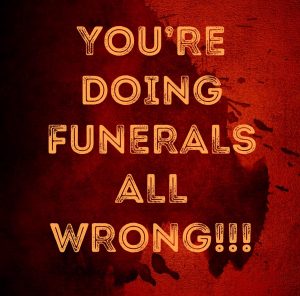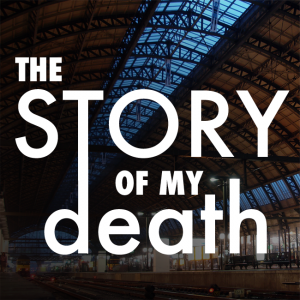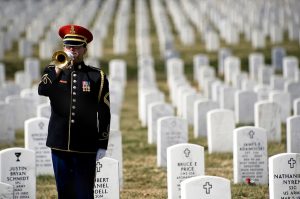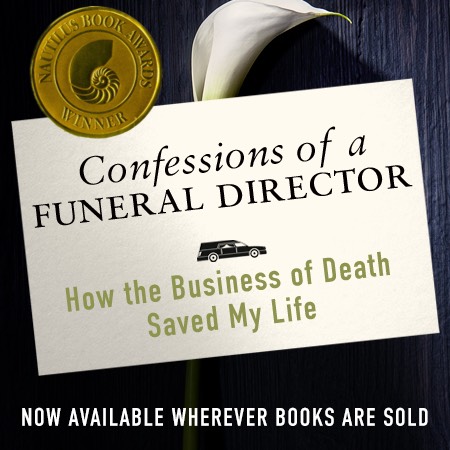Caleb Wilde
(218 comments, 980 posts)
Posts by Caleb Wilde
$1.99. The $1.99 sale of my ebook ends tonight
YOU’RE DOING FUNERALS ALL WRONG!!!

There’s a problem that I want to address. And that problem is dishonorable funerals.
Somewhere along the way, the funeral industry has convinced us (deathcare workers as well), that the ONLY honorable funeral is the traditional funeral (i.e., embalming, casket, full burial and everything that goes with it).
But let me tell you this: if you think an honorable funeral is ONLY a traditional funeral, YOU’RE DOING IT ALL WRONG!!!
An honorable funeral has nothing to do with a viewing. It has nothing to do with caskets. It has nothing to do with a nice cemetery lot. It certainly doesn’t exclude those things, but none of them are necessary.
It’s a dishonorable funeral if you make it all about a traditional funeral and burial.
*****
Somewhere along the way, we’ve become convinced that an honorable funeral is about how much money we spend.
An honorable funeral has nothing to do with how much money you spend.
It’s not about the quality of casket you buy. Or how many flowers flank either side of the casket.
If you think an honorably funeral is about the money and stuff, YOU’RE DOING IT ALL WRONG!!!
*****
Conversely, we’ve become convinced that an honorable funeral is all about how much money you can save.
That the focus should be on frugality. On not falling into the traps laid by the funeral industry.
On cremation. And simplicity. And dying as quietly and silently as possible.
If you think a funeral is about beating the system, YOU’RE DOING IT WRONG!!!
*****
It’s about the people that come to the funeral, we think.
But an honorable funeral has never had anything to do with numbers.
It has nothing to do with how many or how few people come to it.
If you get caught up in WHO is going to be at a funeral, YOU’RE DOING IT WRONG!!!
*****
Somewhere along the way, we’ve been convinced that an honorable funeral is all about the religious element.
But if you think honorable funerals are about which church hosts the funeral, what pastor or priest is doing the eulogy, and which religious cemetery you’re being buried at, YOU’RE DOING IT ALL WRONG!!!
An honorable funeral is so much more than the religious element.
*****
Somewhere along the way, we’ve become convinced that an honorable funeral is about how environmentally friendly we can make it.
An honorable funeral is one that honors the earth. That you can’t have an honorable funeral without a biodegradable casket and a green burial.
I want my body to go green when I die, but if you think a funeral is about your footprint, YOU’RE DOING IT ALL WRONG!!!
*****
Because any funeral that’s honorable is about the deceased. Sometimes honoring the deceased
can involve spending money,
it can involve being frugal,
it can involve a traditional funeral,
it can involve being environmentally friendly (and this is an option we all should know about),
it can involve your friends and extended family,
and it can involve a religious element or none at all.
BUT IF IT’S ABOUT ANY ONE OF THOSE THINGS, AND YOU LOSE FOCUS ON THE DECEASED, YOU’RE DOING IT WRONG!
Funerals are simple. Really. It’s about us expressing our love for our dead. Cheesy, I know. But when we take the time to acknowledge a death and express our love towards the dead (however that may look), you’re doing it right. Because acknowledging and expressing our love for our loved ones sits at the heart of honor. And acknowledging and expressing our love for our dead loved ones sits at the heart of an honorable funeral.
*****
If you like my writing, consider buying my 2017 Nautilus Book Award Gold Winner, Confession of a Funeral Director (click the image to go to the Amazon page):
Christy is a Medium: Episode 11 of The Story of My Death Podcast

“The night (my grandmother) died, her spirit came to me and she told me she was leaving …. That was the first time I had interacted with or seen a ghost of a person.” — Christy
If you’d like to listen, you can subscribe to the podcast via iTunes by clicking HERE.
Or you can listen to the link below:
An “exploding dead body”, a “coerced cremation” and a lawsuit

Here’s the story:
A Montana mortuary business must pay a woman $50,000 after her husband was cremated against his wishes.
The Great Falls Tribune reports a jury found a mortician at Miser Mortuaries in Conrad negligent in the decision to cremate 64-year-old Robert Yeager of Ulm after he died of liver and heart disease in October 2012.
Enid Yeager told jurors that mortuary staff pushed her toward cremation because the larger casket needed to bury her husband would be costly.
Miser’s attorneys said mortician John Nash simply recommended Robert Yeager be cremated because he couldn’t have an open casket funeral due to the swollen condition of his body. Nash said Enid Yeager signed off on having him cremated.
Jurors on Wednesday found both the mortuary and Enid Yeager partially liable. She had sought $1 million in damages. — The New York Times
All in all, I like the ruling. We all like black and white cases, but this one is painted in grey. I don’t think this was a matter of maliciousness on the part of either party, but rather a communication problem, a problem that rests more heavily with Mr. Nash.
Here are some more details that help flesh out the case:
The conflict of this case was borne out of the complications in burying Robert in a casket: he died of liver and heart disease and, as a result, had grown considerably swollen with fluids shortly before and after his death. Court records and testimony included mention of splitting skin, building gases and leaking liquids.
He would have fit in an oversized casket, Miser’s mortician claimed to have told Yeager. But she alleged the funeral home staff pushed her toward cremation because the oversized casket would be very costly, and he “could not have a casket ceremony” because her husband’s body “would explode.” — Great Falls Tribune
I don’t know about you, but I wouldn’t mind my body exploding at my funeral. In Oprah voice, “Everyone get’s a piece of Caleb. You get an arm! You get a leg!”
Who am I kidding, though. Nobody has ever wanted my body.
The funeral business rests on the principle that we exist to serve you … within reason.
Having an open casket viewing for a deceased person who is in the early part of active decay generally not within reason (how he got to this point is the question I’d like to know. I digress.). For those of you who have been around a decomposing body, you know of the troubles in which I speak. We’ve all smelled roadkill in the hot months of summer. That smell is tacos to human decompositions surströmming. Humans just smell the worst. The last thing you’d want is an open casket viewing for a decomposing body. It would literally be nauseating for everyone who came to the funeral with a sense of smell.
However, if you can’t have an open casket viewing, cremation generally isn’t the next step down on the ladder of options. A closed casket with the body present is the next step down the options ladder.
Why did Mr. Nash suggest cremation instead of a closed casket? I suspect that the underlying and unspoken crux of this, specifically as it relates to the funeral home, may have had less to do with the troubles that come with a decomposing body and more to do with two other things:
1.) Money.
I find it interesting that the reports specifically mention that Mr. Yeager needed a larger casket for his swollen body, a casket that would have cost more money … perhaps significantly more money. Larger caskets often necessitate larger vaults, and larger vaults demand more grave digger costs, all of which can easily incur an added $1,000 to $3,000 in cash advances, half of which is associated with the cemetery.
Funeral directors often tend to suggest less expensive options … like cremation, especially if funds are limited. And there’s nothing wrong with suggesting a less expensive option. I do it all the time. In fact, I usually tell the family that I’m going to show them the least expensive options first, and then they can go from there.
2.) Communication.
This is where the problem happened. Obviously. Mrs. Yeager wanted something. Mr. Nash didn’t entirely hear her. Or, Mrs. Yeager wasn’t able to express it well enough for Mr. Nash to hear her because she had “grief brain.” But, Mr. Nash should have recognized her “grief brain” and listened a little more deeply.
Look, I don’t think Mrs. Yeager is sue-happy and just wanted to get a quick mil from the funeral home. I think she is genuinely hurt and upset. And she has every right to be.
I also don’t think Mr. Nash the funeral director was out to get Mrs. Yeager. I have no doubt he had good intentions.
What I do know is this: Funeral directors (and this includes me) need to learn to practice deep listening and mindfulness. In fact (and I’m talking to us funeral directors), if you notice yourself unable to practice deep listening, it’s time for a sabbatical. Or it’s time to find another job (there’s no shame in quitting … too many funeral directors stay in this business far past their expiration date … and there’s an expiration date for EVERY career).
For those of you in the business, here are some mantras you’ve likely heard:
“Mindfulness over money.”
And.
“Service over sales.”
You know those by heart. But here’s a level two funeral service mantra:
“Listening over talking.”
Because, for us as funeral directors, if we want to serve well, we have to deeply listen.
*****
If you like my writing, consider buying my 2017 Nautilus Book Award Gold Winner, Confession of a Funeral Director (click the image to go to the Amazon page):


